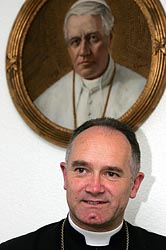At
The Word From Rome, John Allen addresses the homosexuals in seminaries question and publishes comments he made at a university on the global Church. I'd recommend reading both in their entirety because I'm not going to cite specific quotes.
On the seminary question, Allen says little and calls for patience until the actual document is released. He makes an excellent point. In the second part, Allen addresses the global Church and the variety of issues that confront it. He makes the point that the issues facing the American Church are not necessarily those that face the global Church in its entirety.
Taking this concept that the US is not the center of the Roman Catholic universe, one wonders what kind of reception the document on homosexuals in seminaries is getting in other lands around the world. It is going to be a global document, but in our Western pluralist milieu, it seems like a giant cleaver is about to fall and the homosexuals are about to be cut away in one stroke.
But what about Nigeria for instance? Lately, the Nigerians have been dealing with gas price increases due to the end of government subsidies. People are out protesting in the streets.
Today we see a militia has taken control of an oil pumping station and shut it down. For a country that without oil would be just another dirt-poor African state (oh wait, I forgot. Due to corruption, it is dirt-poor anyway), this is national news. Is the Nigerian Church sweating a ban of homosexuals in its seminaries? I doubt it.
But why should we care? As Allen so ably points out with nice facts and figures, US Catholics number 67 million. That's high enough to stand at fourth place on the list of countries with the most Catholics. But what about the three that are ahead of us?
Brazil at 144 million, Mexico at 126 million and the Philippines at 70 million are all concerned with their own problems. Brazil has gone through a number of crises, Mexico has its ethnic divisions and the gap between rich and poor and the Philippines has been dealing with a major scandal and constitutional crisis for several months now that has involved the bishops (as the bishops have long been considered the watchdog of government, having toppled two sitting presidents). Do you think Catholics in those three countries are sweating the document? I doubt it.
Allen doesn't point it out directly, but it seems obvious that in joining the two different topics today, he wants us to connect the dots and realize that whatever major implosion of the American clergy we may be imagining is in the works, the majority of the Catholics in the world who will live under the same document probably aren't devoting much attention, if any.
EDIT: The reference I initially made about Brazil was based on my own recollection that I remembered offhand is was not correct. Thanks to BrazCath for the correction.

--133x198.jpg)


